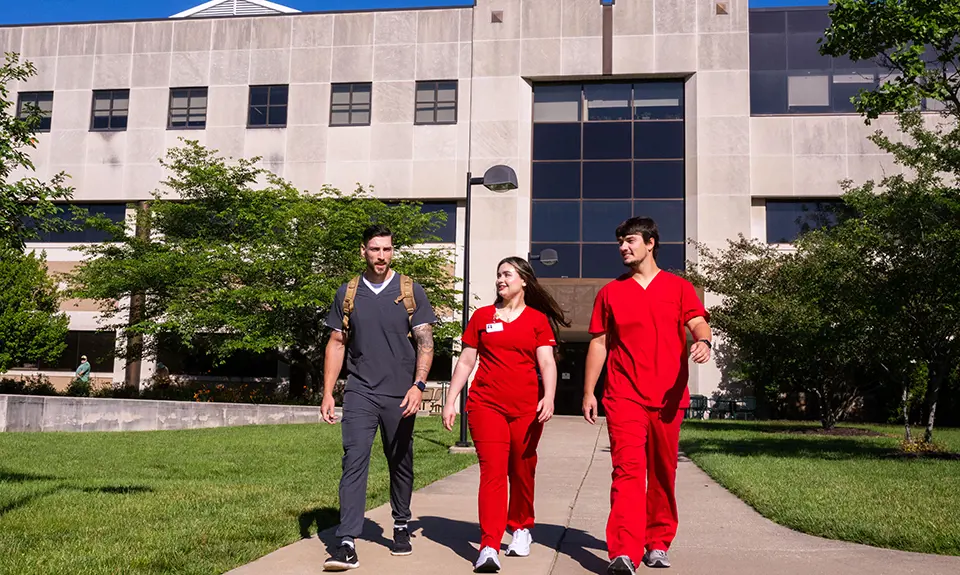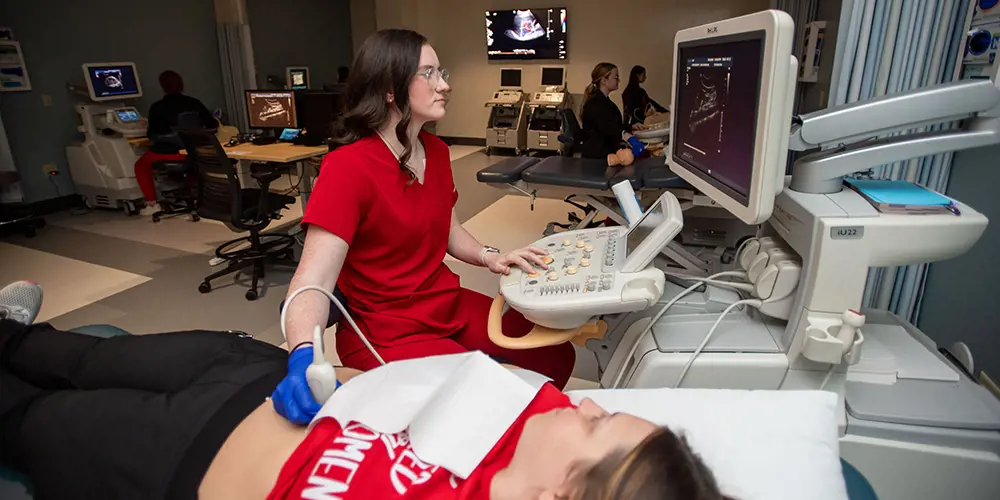In the general sonography and vascular specialty, you will learn to perform abdomen, obstetrics and gynecology and vascular sonography in the only bachelor of science program in the state of Indiana accredited by CAAHEP in these three concentrations. You’ll find a fully functional sonography lab on campus for learning and practice and multiple clinical affiliates for exceptional clinical education. Along the way, you’ll have excellent faculty to learn from. Students will be eligible to apply for national credentialing exams 60 days prior to graduation.
The Diagnostic Medical Sonography Program provides a curriculum which includes didactic courses in conjunction with laboratory and clinical experiences. The DMS curriculum consists of 1.5 years of prerequisite general education courses, 1.5 years of abdominal and OBGYN sonography course work and one year of EITHER vascular sonography or adult cardiac sonography course work.
Note: Once students are accepted into the DMS program, they are required to take 6 credit hours the summer before junior year and 8 credit hours the summer before senior year.
Completion of these four years results in a Bachelor of Science degree. The student will be eligible to apply for credentialing examinations administered by the American Registry for Diagnostic Medical Sonography (ARDMS).
To apply to the University of Southern Indiana (USI) for undergraduate enrollment:
Upon acceptance to USI, you'll receive detailed information about next steps, including orientation, registration and housing.
There is a secondary application process
to be accepted into the Diagnostic Medical Sonography Program
Students may declare a major in pre-Diagnostic Medical Sonography upon entering the university or complete a change of major form at any point in time.
Click the button below to view the requirements and submit an application to the USI Diagnostic Medical Sonography Program.
Overall, a career in sonography offers strong job prospects, a variety of work environments, competitive salaries and opportunities for professional growth. Employment of diagnostic medical sonographers is projected to grow 13 percent from 2024 to 2034, much faster than the average for all occupations, according to the U.S. Bureau of Labor Statistics (2026). This growth is driven by the aging baby-boomer population, which is expected to increase the need for diagnostic imaging services.
Sonographers can work in a variety of settings, including hospitals, physicians' offices, medical and diagnostic laboratories and outpatient care centers. This variety provides flexibility in work environment and potentially more job opportunities. Obtaining certification in general and vascular sonography from recognized organizations, such as the American Registry for Diagnostic Medical Sonography (ARDMS), can enhance job prospects and career advancement opportunities.
*income information provided by O*NET Online. Occupation opportunities vary by region and experience.
The University of Southern Indiana is committed to making college accessible to those wishing to further their education by providing numerous scholarships, grants, and financial aid options to assist students in managing tuition expenses.
The Diagnostic Medical Sonography Program at the University of Southern Indiana is accredited by the Commission on Accreditation of Allied Health Education Programs (CAAHEP) on recommendation by the Joint Review Committee on Education in Diagnostic Medical Sonography (JRC-DMS) in Abdominal-Extended, Obstetrics and Gynecology, Vascular and Adult Cardiac concentrations.
USI DMS Program Number: 110204
Requirements for licensure and certification vary by profession and by state. USI has reviewed the educational requirements for each state and licensing agency to determine if the academic program here at USI meets the educational requirements to be eligible for licensure/certification in each state or not. Please note that some states may have additional requirements for licensure, such as residency requirements, additional non-academic certifications, etc. that USI cannot determine. We encourage you to check with your state's licensing agency for all requirements needed to obtain licensure.


